Currently, people are only asked if they want to become donors when they get or renew driver’s licenses. But as Ohio begins issuing licenses that are valid for eight years, it’s important to ask people to become donors when they renew vehicle registration as well, Koehler said.
“Twenty people die every day (in the United States) waiting for organ donations,” he said.
The bill also increases the amount license-seekers are asked to voluntarily donate to the Second Chance Trust Fund from $1 to $2. And it increases the annual contribution for the “Donate Life” license plate from $5 to $15.
All money from both of those goes to the Second Chance Trust Fund, which is used for educational and development programs on organ, tissue and eye donation.
“In the end it is not going to cost the taxpayers anything,” Koehler said.
The registrar of motor vehicles, in conjunction with the director of health and the Second Chance Trust Fund Advisory Committee, will have to develop rules for how the question can be asked: on the written application for a license or registration, or through online links to a registry application.
Koehler introduced the bill in February, and it passed both houses in September by overwhelming margins. Ohio Gov. Mike DeWine signed it into law Oct. 28 along with two other bills.
The changes have been in the works for six years, Koehler said.
“It’s an example of working very hard on a bill over three General Assemblies,” he said.
The initial version would have increased the number of times people were asked for Second Chance Trust Fund donations, but that would have interfered with similar requests for Save Our Sight Fund donations, Koehler said.
Then the Bureau of Motor Vehicles expressed concern about the increased requests, he said. Koehler said he rewrote the bill with input from all interested parties to secure its passage.
About the Author

